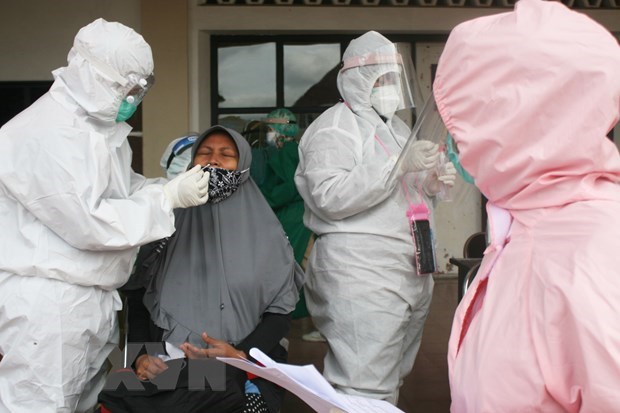
Health workers do swab test for COVID-19 in Surabaya, Indonesia (Photo: Xinhua)
The decision was taken at a virtual coordination meeting for COVID-19 handling in Jakarta, West Java, Central Java, East Java, and Bali chaired by Coordinating Minister for Maritime Affairs and Investment Luhut Binsar Pandjaitan.
The minister ordered to apply stricter restrictions against COVID-19 from December 18 to January 8 next year.
A significant rise in confirmed cases was recorded after the holidays and joint leave at the end of October that necessitated the Indonesian government to tighten restrictions.
In Jakarta, 75 percent of the capital city's employees are urged to work from home.
The policy of limiting operating hours to 7pm and limit the number of people gathering at restaurants, malls, and entertainment venues will be continued, the Indonesian minister affirmed.
Religious, anniversary, or celebratory events that can attract crowds must be restricted or prohibited, he emphasised.
According to Indonesia’s Ministry of Health, the country logged 6,120 COVID-19 cases on December 15, raising the national tally to 629,429, with a death toll of 19,111.
The same day, Cambodian Prime Minister Hun Sen advised the country’s education ministry to cancel the upcoming high school graduation exam and to determine whether a student passes or fails based on the results of semester exams.
He made the remark in a speech live broadcast on the National Television of Cambodia (TVK).
Cambodia's Ministry of Education, Youth and Sports recently decided to postpone the annual high school graduation exam to mid-January, 2021 due to ongoing COVID-19 outbreaks.
The Southeast Asian nation recorded a locally transmitted case on the day, and has seen a total of 362 confirmed COVID-19 cases so far.
Meanwhile, Singapore announced that it will open a new segregated travel lane for a limited number of business, official and high economic value travellers from all countries next month, as part of efforts to revive its key travel and hospitality sectors.
The first travellers will be able to arrive from the second half of January through the new lane, which will be open to those who are coming for short-term stays of up to 14 days.
Travellers under the latest arrangement will have to stick to strict health and testing protocols, and will need to stay within a “bubble” at segregated facilities.
Singapore welcomed only 13,400 visitors in October, compared to 1.7 million reported in January./.
VNA
 Indonesia’s palm oil production set to rise 10% in 2025
Indonesia’s palm oil production set to rise 10% in 2025



